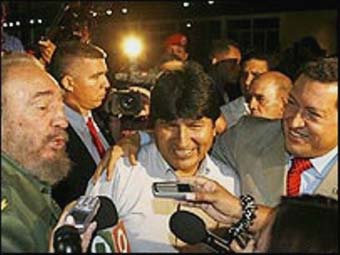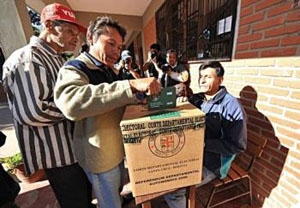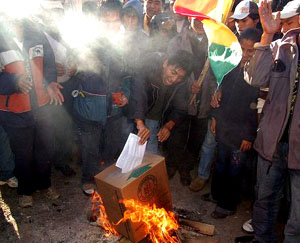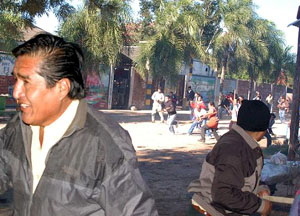 |
International Affairs
An important State votes for autonomy
The Right Sprouts again in Bolivia
Alberto Aprea
Bolivia is sending signs of its discontent with the Marxist government of Evo Morales, elected in December 2005. Since his inauguration, this is the first time a serious reaction has appeared. Recently, the wealthiest State of the country voted for autonomy from the central government. This reaction should be closely watched since it can represent the turning of the red tide in Latin America. One of our readers from Argentina, who traveled to Bolivia to witness the recent referendum, sent TIA this interesting report.
Bolivia has a system of government called a unitary republic, with the public administration centered in La Paz, the country’s capital. The wealthiest State in Bolivia is Santa Cruz, whose capital is the city of Santa Cruz de la Sierra. On May 5 Santa Cruz held a referendum and voted for autonomy from the central government of Morales. In June similar referendums will also be held in three other neighboring States on the question of autonomy. The ensemble of these four States are responsible for 80% of Bolivia’s national production.
After Evo Morales rose to power in 2006, the fight for autonomy grew increasingly stronger in these four States. The Santa Cruz referendum gave a clear victory to the partisans of autonomy. If the balloting in the other three States gives the same result, this could well set off a “domino effect” in the other Bolivian States.

Castro and Chavez went to compliment Marxist Evo Morales for his victory |
In the December 2005 presidential elections, Morales claimed an absolute majority of the votes. However, after only two years in office, he cannot control his government: the States are seeking partial autonomy to break the handcuffs binding them to the central power.
Besides the administrative failure, ideological differences play an important role. On one side is MAS (Movement toward Socialism), of Marxist orientation; on the other is the anti-communist reaction against Morales and the growing Cuban and Venezuelan interference in Bolivia.
In an energy meeting with 12 ministers of South American countries, Venezuelan President Hugo Chavez recently declared that he will “not remain with his arms crossed” in face of the Bolivia situation, and that Bolivia could well fulfill the prediction of Che Guevara that Latin America should have “one, two or even three Vietnams.” Both Morales and Chavez accuse the United States of encouraging the Bolivian States to rebel against the central administration.
Observing the referendum
On May 5, 2008, the city of Santa Cruz, capital of the most affluent State of Bolivia, voted to decide whether or not it should remain dependant on the central government. I live in Cordoba, Argentina, but I traveled to Santa Cruz to observe the balloting process. Here is what I saw and heard.

Bolivians cast votes favoring autonomy |
Sunday morning, election day, I visited various voting sites in downtown Santa Cruz and talked with many persons who supported the referendum, among them Jorge Tuto Quiroga, who had assumed the presidency for one year in 2001 after president Hugo Banzer resigned for health reasons.
Since the voting was proceeding peacefully downtown, at noon I went to a district called “Plan 3000,” which has around 260,000 inhabitants. This area is considered one of the nesting grounds of MAS, which supports Evo Morales. Partisans of MAS had announced they would try to prevent the voting, by violence if necessary. As we drew near the district, my taxi was stopped and the driver was advised to turn around. The driver became quite frightened, so I left him behind and started to walk toward the center of the district on the unpaved road.
I crossed several parked ambulances waiting for calls. Then, I heard shooting. At first I thought it was real gunfire, but as I came closer, I realized the sound was coming from tear gas bullets the police were shooting to disperse the MAS agitators. The demonstrators – numbering around 800 to 1,000 – were trying to take over the voting stations to prevent bad results for the Morales government. The agitators were armed with wood sticks, iron rods and “blast” bombs [which explode, make a loud noise to produce panic, but don’t kill].

MAS agitators burning ballots in the streets |
Defending the balloting stations were persons from the district favorable to the referendum, most of them young people from age 14 to 20, members of the Youth League of Santa Cruz [Union Juvenil Santacruceña]. They, too, were armed with stones, chains, wood sticks and iron rods; they also had the “blast” bombs. This particular group was defending one of the high schools set up as a voting station.
When MAS agitators would approach the high school, these youth would confront them shouting, “We’re not afraid of you!” and run against the agitators. Thanks to their action, the high school was not overtaken and, when it came time to close the voting station, the ballot boxes could be officially sealed and transported to the central referendum headquarters. The vehicle carrying them was followed by a truck filled with youth to fend off any other attempts of the MAS agitators to thwart the vote.
Not far from the high school was a square where the MAS agitators had gathered. I had stopped there on my way to the school. Orators had set up there and were speaking against the referendum, one after another. They were inciting the audience to stop the elections, preaching civil war, even exhorting bloodshed, if necessary. The revolutionary tone of those speeches gave me the impression I was in a communist country. Notwithstanding all these preparations, the agitators always ran from the youth when the latter counter-attacked.
Let me note in passing that I could see many persons who were just standing around, observing the agitators without participating. I decided to run a test: I went to get something to eat at a local stand close to the square. I was treated with civility and respect.
The voting closed at that high-school, and the youths protecting the station filed into buses taking them to another ballot station several miles away where the voting was still in progress. I entered one of the buses with them. Before we reached the site, the police stopped the bus, made us get off, and confiscated the stones, sticks, bombs, etc. from the youths, who vehemently protested. They began to line up to march toward the voting place, but before they reached it, they were informed that another group of young people had protected the station, and that the ballot boxes had already been transferred to the headquarters.

MAS agitators flee when pro-autonomy defenders drive them away from a Plan 3000 polling station |
Returning to downtown Santa Cruz, I saw the central square filling with people awaiting the results of the referendum. Reports of the first results were favorable to autonomy. Partial results were announced close to midnight. At that late hour, there were probably about 60,000 people on the square. [Exit polls conducted by local television stations showed more than 85% of the 930,000-strong electorate approved the autonomy after a day of balloting marked by sporadic clashes]
When the prefect, Ruben Costa, made a passing reference to the fight against Marxism in a speech in that square, his words were received with applause and shouts of approval. Later, however, when he praised Socialism, declaring that: “a real Socialist Revolution is being made,” these words were received with icy silence.
In short, I had the impression that there is a real openness in that State for an enlightening anti-Communist action. If I were to give any advice to the people of the other States of Bolivia where similar referendums will take place, I would tell them: Go out and vote. Many of those who did not vote in Santa Cruz would have voted “yes” to autonomy, but they refrained because they thought that the triumph was assured and that it wasn’t worthwhile to make the effort. On the contrary, it is very worthwhile to show your approval for autonomy.
So far, it seems that the people from the four States in this region are disposed to keep the fight for autonomy going, doing whatever it takes to ensure success.

Posted June 2, 2008

Related Topics of Interest
 South America is Becoming Communist South America is Becoming Communist
 New Grand Alliance of Terror New Grand Alliance of Terror
 Castro successor is Hugo Chavez Castro successor is Hugo Chavez
 In Cuba Card. Bertone Attacks American Embargo In Cuba Card. Bertone Attacks American Embargo
 Benedict XVI and Cardinal Bertone’s Trip to Cuba Benedict XVI and Cardinal Bertone’s Trip to Cuba
 CELAM in Cuba: Cordial Dialogue Between Wolves and Shepherds CELAM in Cuba: Cordial Dialogue Between Wolves and Shepherds
 JPII, Cuba and a Problem of Conscience JPII, Cuba and a Problem of Conscience
 Declaration of Resistance to the Vatican Ostpolitik Declaration of Resistance to the Vatican Ostpolitik

 
|
International Affairs | Hot Topics | Home | Books | CDs | Search | Contact Us | Donate

© 2002- Tradition in Action, Inc. All Rights
Reserved
|
 |
|